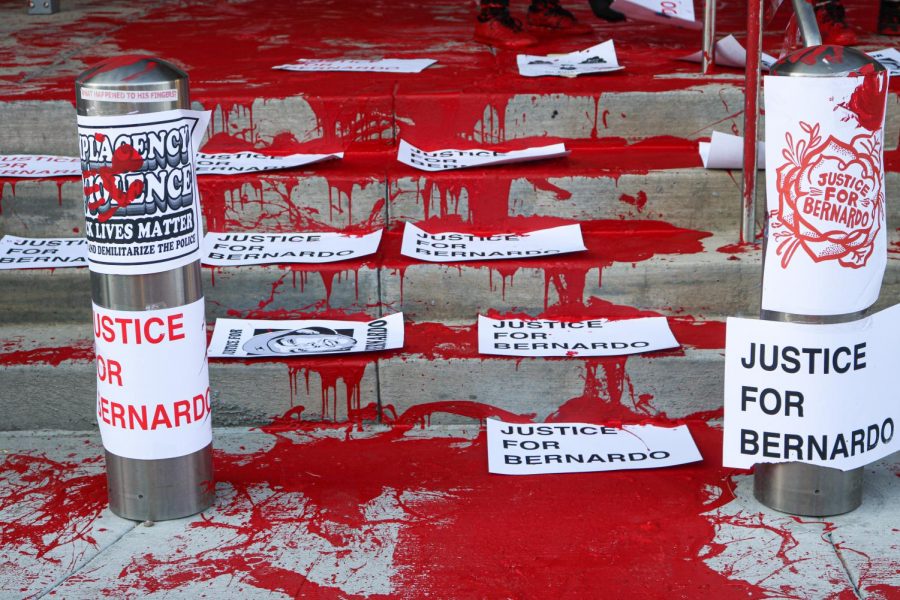McGrath: No, SLCPD, a Tipped Car Does Not Justify Police Violence
Protesters paint the district attorney office in Salt Lake City red to illustrate the “blood on Gill’s hands” after the earlier decision that declared officers involved in the killing of Bernardo Palacios-Carbajal as justified on July 9, 2020. (Photo by Ivana Martinez | Daily Utah Chronicle)
August 3, 2020
A 26-year-old man was charged with arson in June, and faces a five- to 20-year prison sentence for lighting a tipped police car on fire at Salt Lake City’s first George Floyd protest on May 30. Responding to the vandalism, United States Attorney John Huber said, among other things, that the day “was a dark day in Utah.” Was it? What about when police physically harm citizens? Is that considered a “dark day?”
This past month, unidentified federal agents in military-grade gear beat, tear-gassed and physically moved Black Lives Matter protesters in unmarked vehicles in Portland, Oregon, all in the name of preventing federal property damage. These horrific actions and statements like Huber’s create a clear narrative of taking vandalism more seriously than human life. In the wake of these situations, ACLE of Utah denounced the SLCPD demonstration of a militarized police force at recent protests.
Federal and local governments seem to be talking about and responding to property damage in these ways to prompt indifferent voters to oppose such protests and what they stand for. They are misusing the word “violence” and implying that burning a car is the same as killing an unarmed man. Focusing on property damage distracts people from the real problem — militarized police violence.
The unidentified agents in Portland – and now Detroit, Cleveland and other cities – work for Customs and Border Control, Immigration and Customs Enforcement, the Transportation Security Administration and the Coast Guard. All grouped together, they’re called Rapid Deployment Teams. These teams claim to have been activated in an effort to “[secure] federal buildings from graffiti and vandalism in tandem with the Federal Protective Service.” But why should property damage require such a sinister response? That reasoning seems like an excuse.
Based on the results of their intervention, these teams are there purely to make Portland’s protests look out of control while completely acting above the law. The Acting Secretary of Homeland Security told Fox News that the department would take the violent tactics used in Portland nationwide. “I don’t need invitations by the state, state mayors or state governors to do our job,” he said. “We’re going to do that, whether they like us there or not.” How is this an appropriate response to property damage? How does this not scream obstruction of law and justice? It should terrify us that a senior DHS official is spreading the idea that property damage is an act of violence and demands a federal and military response. It needs a community response, not one with riot gear.
ACLU’s recent response to Utah police officers’ use of force during protests began when the group’s Legal Observers reported seeing state sanctioned violence. “Since shortly after the daily protests began in response to the killings of George Floyd and Bernardo Palacios-Carbajal by police officers, law enforcement has used potential and actual damage to property to justify militarized violence against the human bodies of protestors,” the statement reads. At the July 9 protest against the justified murder of Palacios, where protestors broke windows at the District Attorney’s office, Salt Lake City Police Chief Mike Brown “declared [the protest] an unlawful assembly.” Officers then proceeded to “push protesters to the ground, hit them with clubs, and ram a police car into a protester’s vehicle.” Put simply, Utahns asked for department accountability when it comes to murder and police brutality, and were met with police brutality yet again. Later, five protestors received criminal charges for vandalizing the District Attorney’s Office. And the police who shot Palacios 20 times, enough for his fingers to be missing at his burial? Not one of them has been charged, because painting the DA’s office red is seen as more criminal than murder.
If Salt Lake City leaders condemn property damage but not police violence, how are we any better off than Portland? If tipping cars and smashing windows are violent acts, how do we define shooting rubber bullets into crowds? When the president tweets, “When the looting starts, the shooting starts,” that should signal to us that our entire police system is distorted and dangerous. “The shooting” and “the looting” are not comparable acts. Stealing property is not the same as murder. Creating the rhetoric that property damage is violent and to the same degree as taking a life enables police sanctioned violence not only nationally but also in our own backyard.







